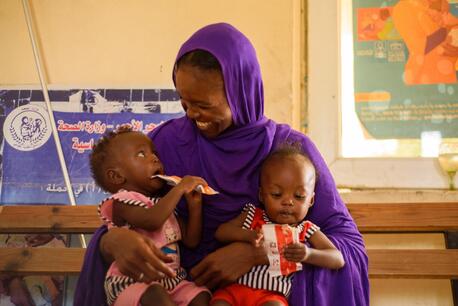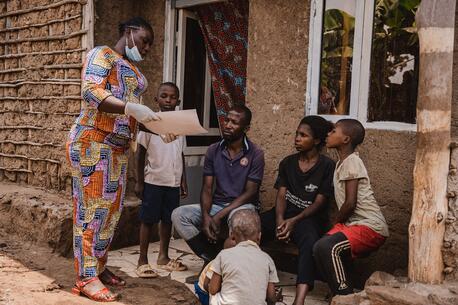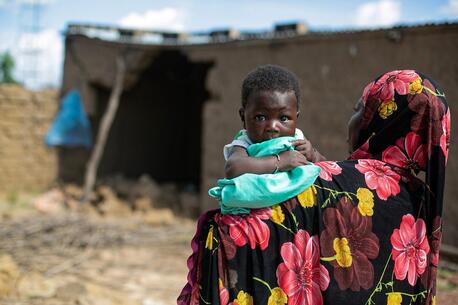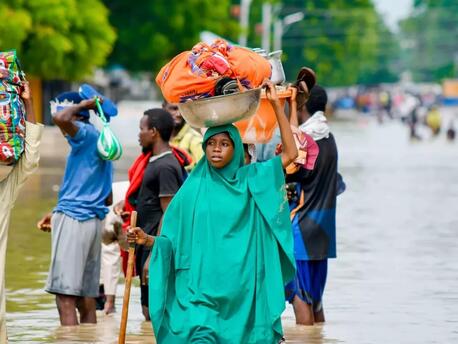
Child Malnutrition in Sudan: One Mother's Story
Poor access to nutrition made Arafa almost lose her twins. UNICEF is helping them recover — but much more needs to be done to ensure the same outcome for millions of other children in Sudan who remain at risk.
Arafa Musa cuddles her 1-year-old twin daughters Mawada and Mushtaha while waiting for their review at Dar Al-Salam health facility in Port Sudan in Red Sea State, eastern Sudan. She breastfeeds them in turn, occasionally speaking to them softly.
The family has come to the facility for their weekly checkup after enrolling in the outpatient therapeutic program for nutrition treatment and care.

Mawada was found to be severely acutely malnourished, Mushtaha moderately acutely so. On the waiting bench are several other mothers of children with severe acute malnutrition, a life-threatening condition also known as child wasting.
Some of the children look small, thin and frail. Others have edema, or swelling in the feet. They are just a fraction of the hundreds of thousands of children all across Sudan who have been battling the worst and most deadly form of malnutrition as the country remains gripped by violent conflict.
With clashes spreading across many more states, pushing families out of their homes, parents and caretakers have continued to struggle to find nutritious food for their children.
UNICEF: over 700,000 children in Sudan suffering from life-threatening severe acute malnutrition
UNICEF estimates that there are over 700,000 children in Sudan currently suffering from life-threatening severe acute malnutrition. Without urgent care and treatment, they are at high risk of death.
To ensure children like Mawada and Mushtaha receive timely treatment, UNICEF is providing health and nutrition supplies — including Ready-to-Use Therapeutic Food (RUTF), among other essential nutrition items and medicines — to various health facilities, including those in hotspot areas.

UNICEF also helps ensure continuous service delivery at health facilities and through mobile teams, by covering operating costs and through capacity building and monitoring activities.
Mawada's steady progress
Dar Al-Salam's outpatient clinic is run by a team of nutritionists led by Jawahir Bashir Ahmed. Every Tuesday, Jawahir attends to the mothers one by one — screening the children, measuring their weight and height, checking for edema and keeping records on pink cards. This is followed by a session with the mothers to discuss the children's progress and then replenish their supply of RUTF sachets to cover the week until their next appointment.
During the waiting time, the children undergo an appetite test, where each child is provided with a sachet of RUTF if severely malnourished, or Ready-to-Use Supplementary Food (RUSF) if moderately malnourished. The nutritionists watch the children closely to see how they do. Many are able to nibble on the peanut paste and take sips of water, passing the test. But some are too weak, a sign there could be another problem.

Mawada eats the paste very well. Then it is her turn to be screened. The reading on the MUAC tape — used to measure a child's middle-upper arm circumference — is still in the red zone. Despite making progress, she is still severely malnourished and weighs just over 11 lbs.
While they are late on their growth milestones, Arafa says she is optimistic that with the nutrition care provided at the facility, her children will thrive and get better soon.
"I hope to hear them say Mama (mother) and Baba (father) and hope they grow up healthy and bring happiness to my life,” Arafa shares with a sigh of relief.
Impact of poor-quality meals
Arafa brought her children to the facility because they were unwell. Like many of the mothers whose children are enrolled in the outpatient program, she did not realize they were malnourished until she sought help for their other medical conditions.
“I fed them what we eat at home,” Arafa explained. Even when she did obtain certain foods, she says, she didn’t mix them well to create an appropriately balanced meal.
Having learned about child nutrition from Jawahir and from the counseling sessions, Arafa says she now knows what she needs to do to better support her twins' growth and development. She says she would like to diversify their diet — but affordability is still an issue. Her daily struggles to make ends meet affects her ability to afford the variety of foods recommended.
Nutrition and health care services are integrated at UNICEF-supported facilities in Sudan
UNICEF Health and Nutrition Officer Ahmed Mustafa noted that in addition to the outpatient program for malnourished children, mothers with children aged six months to 5 years and pregnant and lactating mothers can enroll in a separate Mother and Child Cash Transfer Plus program.
Through all entry points, children are checked for malnutrition to support early detection. During antenatal care sessions, mothers are enrolled in support groups where they learn more about breastfeeding and other recommended infant and child feeding practices.
Arafa ends her visit at the facility by obtaining the required RUTF ration for her child. She says she is determined to support her children as they heal and to help them grow well.

Hundreds of millions of children are malnourished or undernourished — harming their ability to survive, thrive and reach their full potential. Learn more about how UNICEF is improving child nutrition globally.
Help support this lifesaving work. Donate today.
This story was originally published on UNICEF.org
HOW TO HELP
There are many ways to make a difference
War, famine, poverty, natural disasters — threats to the world's children keep coming. But UNICEF won't stop working to keep children healthy and safe.
UNICEF works in over 190 countries and territories — more places than any other children's organization. UNICEF has the world's largest humanitarian warehouse and, when disaster strikes, can get supplies almost anywhere within 72 hours. Constantly innovating, always advocating for a better world for children, UNICEF works to ensure that every child can grow up healthy, educated, protected and respected.
Would you like to help give all children the opportunity to reach their full potential? There are many ways to get involved.





